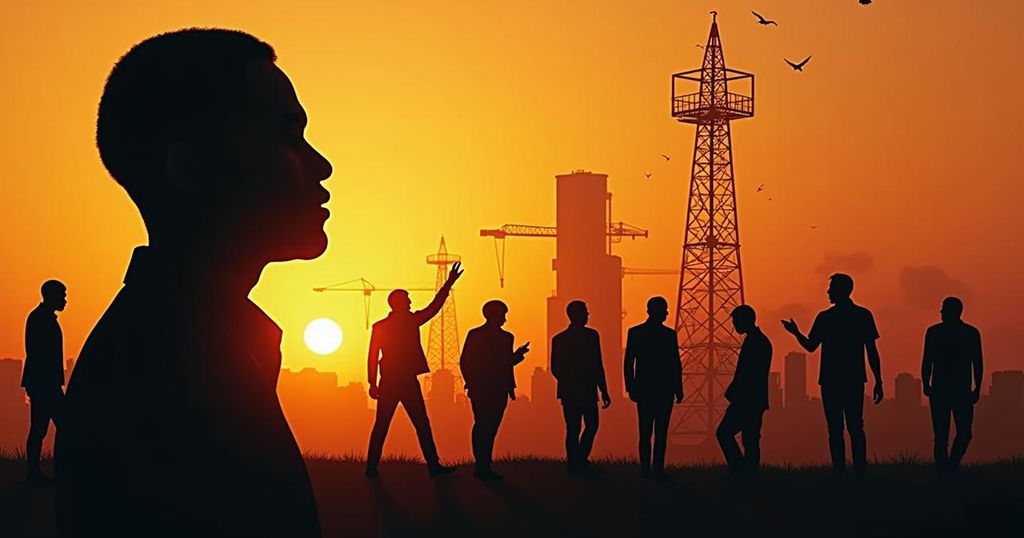Overview of Mozambique’s Presidential Election: Key Insights and Implications
Mozambique’s presidential election will be held on Wednesday, with 17 million registered voters deciding the future leadership amidst challenges such as a persistent jihadist insurgency and severe food shortages. David Chapo represents the ruling Frelimo party while independent candidate Venacio Mondlane has garnered notable support. The outcomes of this election are crucial for addressing ongoing crises and restoring faith in the electoral process following previous allegations of misconduct.
Mozambicans are poised to participate in a decisive presidential election on Wednesday, marking the end of President Filipe Nyusi’s two-term tenure. Approximately 17 million voters are registered for this election, which will also determine the composition of the National Assembly and provincial assemblies in this nation of 31 million people. Despite expectations that the ruling Front for the Liberation of Mozambique (Frelimo) will maintain its hold on power, four candidates are seeking to spearhead change in a country grappling with a protracted jihadist insurgency in the northern region and facing challenges associated with severe climate events along its extensive coastline. In recent years, the growing insurgency has displaced more than 1.3 million individuals, while drought has precipitated widespread food shortages, affecting millions. Compared to local elections held the previous year, which were marred by allegations of vote manipulation and ensuing public unrest, current sentiments appear more subdued concerning potential irregularities. The Frelimo party has nominated David Chapo, a 47-year-old former governor of Inhambane province, as its presidential candidate. Chapo is expected to face significant competition from Venacio Mondlane, a 50-year-old independent candidate and banker, who has rallied substantial support with the slogan “Save Mozambique, this country’s ours.” Mondlane’s campaign is substantially backed by the Optimistic Party for the Development of Mozambique (Podemos), a dissident faction of the ruling party. Competing for voter attention is Lutero Simango of the Democratic Movement of Mozambique, whose policies addressing economic inequality resonate with the youth demographic, and Ossufo Momade of the Mozambique National Resistance (Renamo), which has historical roots as a rebel entity. Amidst this political contest, candidates are required to confront critical issues such as the ongoing insurgency, which has elicited threats to community stability in Cabo Delgado, severe unemployment rates, and escalating hunger levels exacerbated by weather patterns induced by El Niño. The pervasive corruption within the ruling party, illustrated by scandals such as the infamous “tuna bond” debacle, continues to overshadow Frelimo’s governance, creating an atmosphere of skepticism among voters. Voters will engage in a single day of voting, followed by an immediate commencement of ballot counting. Initial results will be made public shortly thereafter, while official outcomes will be announced by the National Election Commission within 15 days. Subsequent validation will occur through the Constitutional Council, with provisions for parties to submit objections.
Mozambique’s upcoming presidential election represents a pivotal moment for the country as it transitions from President Filipe Nyusi’s leadership after two consecutive terms. The election is burdened with the weight of ongoing internal challenges, particularly the insurgency affecting northern regions and broader socio-economic issues impacting its populace through widespread food shortages and displacement due to violence. The backdrop of the election is further complicated by past allegations of electoral misconduct, adding to the uncertainty of public perception toward the fairness of the process. As Mozambique heads to the polls, the main candidates come from a mix of established parties and independent backgrounds, reflecting the evolving political landscape and voters’ desires for reform amidst the looming threats to national stability.
In summary, the ballot this Wednesday constitutes a critical juncture for Mozambique, as citizens rally to select a leader who will navigate not only the country’s immediate crises—including insurgency and economic distress—but also restore public confidence in electoral integrity. While the ruling Frelimo party remains the frontrunner, independent candidates and opposition parties present significant challenges, reflecting the populace’s urgency for change. As the nation moves toward this election, all eyes are on the political dynamics that will unfold, which are poised to shape Mozambique’s trajectory in the years to come.
Original Source: apnews.com




Post Comment